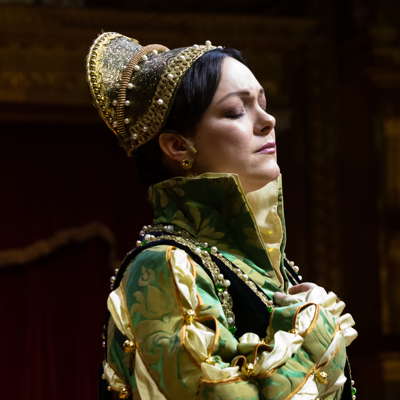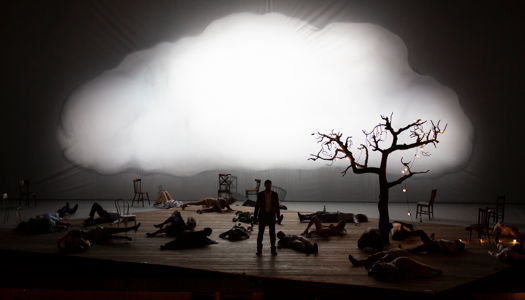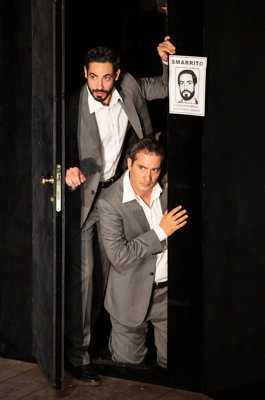- Franz Beck
- Mary Elvidge
- Ronald Stevenson
- Ronald Settle
- double bass music
- Grigori Zhislin
- Schumannfest 2026
- Emily Sun
 FROM ROME: From December 2009 until March 2023, the late Giuseppe Pennisi sent us regular reports from the Italian opera and classical music scene.
FROM ROME: From December 2009 until March 2023, the late Giuseppe Pennisi sent us regular reports from the Italian opera and classical music scene.
 PODCAST: John Dante Prevedini leads a discussion about Classical Music and Visual Disability, including contributions from Charlotte Hardwick, Robert McCarney, Halida Dinova and Giuseppe Pennisi.
PODCAST: John Dante Prevedini leads a discussion about Classical Music and Visual Disability, including contributions from Charlotte Hardwick, Robert McCarney, Halida Dinova and Giuseppe Pennisi.
Take A Sabbatical
GIUSEPPE PENNISI has some advice
for Graham Vick, based on the latter's
latest production of 'Don Giovanni'
On 28 September 2019, a new production of Mozart's Don Giovanni was unveiled in Rome's Teatro dell'Opera. It was much awaited because, since 1886, when the opera had its debut on Rome's main stage, productions of this masterpiece have been few and far between but with excellent conductors - Faccio, Serafin, Böhm, von Karajan, Gui, Kuhn, Soudant - and directors - von Wymetal, Schuh, Rienking, Wallmann, Savary, Proietti and Zeffirelli. The theatre was full to the hilt. The production is entrusted to a young and upcoming French conductor, Jérémie Rhorer, much appreciated in Mozart's work, especially in a 2017 Aix-en-Provence Don Giovanni production, and to the British director Graham Vick, who is considered a star in Italian theatres.
I will comment briefly on the staging. Graham Vick has directed at least eight different productions of Don Giovanni, including one co-produced by ten different theatres - eight in Italy and two in France - some five years ago. He is a Commander of the British Empire, and has received many awards. I assumed that a professional of his standing would have learned the lessons of the boos his 2014 Don Giovanni received, and would have concluded either that he should have conceived a wholly different production or that this Mozart opera is no longer for him.
On 28 September when, at the curtain calls, he and his creative team appeared on the stage, they were submerged by boos when the audience was still applauding the conductor, the orchestra, the cast and the chorus.
The production is somewhat different from that of 2014. The explicit tones of sex, blood and violence have been tamed: these ingredients no longer attract operagoers. This 2019 production is mostly in grey and white, which fits the apologue of a long day's journey towards death of a rake who, in his desperate loneliness, attempts unsuccessfully to seduce three women before going to hell.

A scene from Graham Vick's Don Giovanni at Teatro dell'Opera di Roma. Photo © 2019 Yasuko Kageyama
However, as in 2014, Vick misses the basic point: the key is D major for Don Giovanni and his main antagonist (the 'Commendatore') and D minor for all the others. Don Giovanni and the Commendatore anticipate German Romantic opera such as those by Weber and Marschner, while the others are still part of the seventeenth century Italian operatic conventions. Don Giovanni and the Commendatore are diabolic characters, while the others belong to an ordinary seventeenth century comedy world, even though there are social differences between Donna Anna, Donna Elvira and Don Ottavio - the aristocrats, on the one hand, and Leporello, Zerlina and Masetto - the plebeians, on the other. It is quite confusing to see Don Giovanni and Leporello in almost identical grey business suits, the Commendatore set as a farmer and the aristocrats and peasants looking as if they belong to the same social group. The acting is quite good in the first part, quite elementary in the second act and misses the point in the scene when Donna Anna and Don Ottavio attempt, quite unsuccessfully, to start a new union.

Alessio Arduini as Don Giovanni and Vito Priante as Leporello in Mozart's Don Giovanni at Teatro dell'Opera di Roma. Photo © 2019 Yasuko Kageyama
Certainly, Vick knows that at the time of composing Don Giovanni, Mozart was a member of a rather strict Roman Catholic association. Thus, he really meant to show how a dissolute life is damned. In addition, the Prague version is chosen for the production, where the indictment of the rake by the whole of society is more explicit. At the end, however, there is no indication that the rake goes to hell. He shakes hands with the Commendatore, who flips back into his tomb; then, Don Giovanni exits from a left side door just to come back and jump onto the branch of a tree, where he looks, smiling, at the other characters. There are several other flaws. As his 2017 Così fan tutte and his 2018 Le nozze di Figaro produced in Rome received very mixed results, Graham Vick may consider a sabbatical - at least as far as Mozart is concerned.
On the other hand, the musical part is quite good. Jérémie Rhorer and the excellent orchestra of the Teatro dell'Opera are well aware that this opera is two-faced. On the one hand, it looks at the German nineteenth century yet to come, and anticipates moments of Der Vampyr and of Der Freischütz, such as in the first scene of the first act, in the cemetery scene and the finale of the second act. On the other, it is deeply rooted in the conventions of Italian operatic comedies of the seventeenth century.
Vocally, Alessio Arduini is a good Don Giovanni, but he acts, or is required to act, like a Post Office clerk starved of sex (and not fearing death). Vito Priante is a well-experienced Leporello. Antonio Di Matteo has the voice for the Commendatore but, as already said, is made to look like a farmer. Emanuele Cordaro is a good Masetto. Juan Francisco Gatell excels in the men's group, both vocally and as an actor; moreover he should be praised because he had a slight incident during the finale of the first act, and continued to sing and act in Act II, albeit walking with a cane.
The women's group is of very high standing: a dramatic soprano - Maria Grazia Schiavo as Donna Anna, a lyric coloratura soprano - Salome Jicia as Donna Elvira, and a light lyric soprano - Marianne Croux as Zerlina.
Copyright © 3 October 2019
Giuseppe Pennisi,
Rome, Italy

FURTHER INFORMATION: DON GIOVANNI


